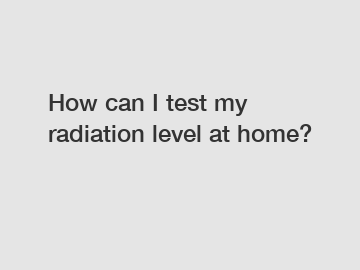How can I test my radiation level at home?
Radiation is a constant presence in our environment, whether it's coming from the sun's rays or the electronic devices we use every day. While low levels of radiation are generally harmless, exposure to high levels can have serious health consequences. So, it's important to know how to test your radiation levels at home to ensure that you and your loved ones are safe.
There are a few different ways that you can test your radiation levels at home, ranging from simple DIY methods to more advanced devices. Here are some options to consider:
1. Geiger Counters: Geiger counters are commonly used to measure radiation levels, and they are relatively easy to use. These handy devices detect ionizing radiation, such as alpha, beta, and gamma rays, and can give you an accurate reading of the radiation levels in your environment. There are many different models of Geiger counters available for purchase online, ranging from basic models to more advanced options that can provide detailed data and alerts for high radiation levels.

To use a Geiger counter, simply turn it on and hold it up to the source of radiation you want to test. The device will emit a series of clicks or beeps, with the frequency of the sounds indicating the level of radiation present. Some Geiger counters also come with digital displays that show the exact radiation levels in microsieverts per hour.
2. Dosimeters: Dosimeters are another option for testing radiation levels at home. These devices are typically worn on the body and can measure the cumulative dose of radiation that you have been exposed to over a period of time. Dosimeters are commonly used by professionals who work in radiation-prone environments, such as nuclear power plants or medical facilities, but they can also be used by individuals who want to monitor their radiation exposure at home.
To use a dosimeter, simply wear it on your person for a specified period of time, such as a day or a week, and then send it to a lab for analysis. The lab will provide you with a detailed report of your radiation exposure, including the dose received and any potential health risks associated with that level of exposure.
3. DIY Methods: If you're looking for a more budget-friendly option, there are also DIY methods for testing radiation levels at home. One simple way to do this is by using a piece of photographic film, such as an undeveloped X-ray film or a piece of black-and-white film. Simply place the film near the source of radiation you want to test, such as a household appliance or electronic device, and leave it in place for a few hours.
Afterwards, develop the film according to the manufacturer's instructions and look for any darkening or fogging on the film. These changes in the film can indicate exposure to radiation and can give you a rough idea of the radiation levels in your environment.
4. Smartphone Apps: In today's digital age, there are even smartphone apps available that claim to measure radiation levels using the device's built-in sensors. While these apps may not be as accurate as professional-grade Geiger counters or dosimeters, they can still provide a rough estimate of the radiation levels in your surroundings.
One popular app is the "Radiation Detector" app, which uses the smartphone's camera sensor to detect radiation levels. Simply open the app, point the camera at the source of radiation, and wait for the app to provide you with a radiation reading. Keep in mind that these apps are not a substitute for professional radiation detection devices, but they can still be a helpful tool for monitoring radiation levels on the go.
In conclusion, testing your radiation levels at home is an important step in ensuring your health and safety. Whether you choose to invest in a Geiger counter, use a dosimeter, try out a DIY method, or download a smartphone app, it's essential to stay informed about the radiation levels in your environment. By taking proactive measures to monitor your radiation exposure, you can better protect yourself and your loved ones from potential health risks.
Are you interested in learning more about radiation sensor on UAV, radiation sensor on UAV, radiation monitoring system on UAV? Contact us today to secure an expert consultation!


